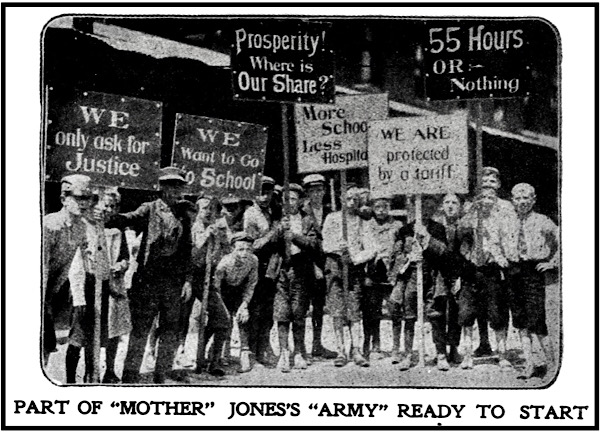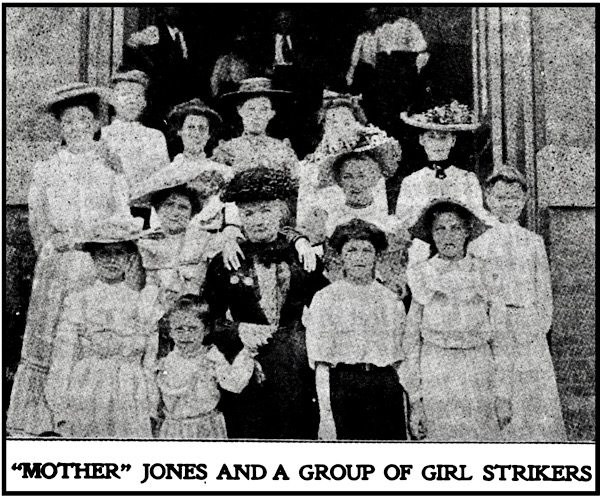 —————
—————
Hellraisers Journal – Monday August 3, 1903
“Child slavery’s awful curse eats at the vitals of the nation.”
From The Comrade of August 1903:
Child Slaves of Philadelphia
By J. Spargo
CHILD slavery’s awful curse eats at the vitals of the nation. But nowhere to a more alarming extent than in the City of Philadelphia. The great textile industries rest upon the enslavement of children and women. Not even in the South are conditions worse than here. At present the majority of the mills are idle owing to a strike for shorter hours of labor, and the children, or those of them who have not been cowed into submission, being on strike they are free to enjoy the fresh air. But when the mills are working the boys and girls are caged up for sixty hours a week in the unhealthy atmosphere common to these industrial hells.
The present strike in an effort on the part of the textile workers to obtain a reduction of the working hours to fifty- five per week. Although wages are miserably low they are willing to forfeit five hours’ pay if only they can obtain the desired reduction of hours.
In 1892, the year of the great panic, wages in the textile industry fell enormously. The Dingley Tariff of 1894 was to restore wages and improve conditions all round. So the workers voted for “Protection.” They continue to vote for “Protection” despite the fact that wages are still lower than in 1892, and that women and children-especially children-are employed in ever increasing numbers.
The law fixes the minimum age at which children may be employed in factories at thirteen years. The cold, calculating brutality of men deliberately passing a law permitting boys and girls of thirteen to be employed sixty hours a week is even more disgraceful than neglect of the question altogether would be. It is certain, however, that the law has very little effect so far as maintaining even the minimum is concerned.
There are said to be sixteen thousand children at work in the textile industries of Philadelphia, and it is certain that thousands of these are below the legal age. Factory inspection is of the most perfunctory kind: false certificates are not difficult to obtain, and it is easy to use certificates of older children to cover any “suspects.” Moreover, the parents themselves are, in too many cases, ignorant enough-or poor enough-to swear falsely as to the ages of their children. In thousands of cases this is exactly what happens. No one who knows anything whatever about the subject doubts that there are thousands of children between the ages of ten and twelve employed in the textile industries of this city in normal times.
On the morning before “Mother” Jones started to march to New York with her little “army of crusaders” from the Kensington Labor Lyceum, early in July, I saw a number of such children of both sexes. Whenever “Mother” or myself asked one of them his or her age we got the stereotyped reply “Thirteen!” But even if one could believe they spoke the truth, the fact remains that not a few of them had been employed for periods ranging from a few months to two years or even more. One little fellow told me how, in the factory where he worked, when the inspector came round, the smallest of them were either hidden or sent out to play. In not a few cases the “inspection” of the factory all takes place in the employer’s office as every intelligent mill worker knows.
One of the effects of child labor, the illiteracy of adults, I have observed here and in the surrounding towns and villages to a much greater extent than anywhere else in this country. It is by no means an uncommon thing to meet native born Americans of twenty-five years of age, or over, unable to read or write even their own names! What a terrible price to pay for the folly and crime of child labor!
Of course, the first break in the ranks of the strikers took place among the children. Poor children! they entered upon the strike with light hearts. To them it meant a chance to rest; to straighten their little backs. But they were in most cases easily browbeaten by the brutal bosses or their agents. I heard of several cases where mothers took their children-literally dragged them-to the mill gates and forced them inside to “scab.” One little fellow I heard of was dragged and beaten by his mother right up to the mill door when he was roughly pulled inside by a bully of a foreman who hurled a volley of curses at the cowering child. And the burden of the little fellow’s cry was “Don’t make me scab! I’ll die first! Don’t make me scab!”


